How to Work with a Marketing Agency: The Complete Guide
B2B purchases – like which marketing agency to hire – tend to be more emotionally charged than B2C purchases. They can have large, substantial impacts that skyrocket your business toward new heights or strap on cement shoes that drag down your bottom line.
No one ever lost their job from buying the wrong type of toothpaste.
Pick the wrong web partner, however, and it could mean a costly redo, a team full of angry people, and a big bucket of sunk costs.
If you’re committed to growth and building a great team, you can dramatically speed up the process by finding the right marketing agency.
While there are risks inherent in any B2B partnership, we’ll show you how to navigate your way through them and set yourself up for success.
How to Get It Right
Here’s the complete guide to working with a marketing agency – from understanding the landscape, to picking the right partner, to how to measure the right results and ensure a successful, smooth road for all parties.
And, if things go south, we’ll walk you through when and how to fire an agency.
If you know the landscape, know what to look for, and know the results you want – even if it’s defining the right marketing KPIs – you can find a perfect marketing partner; the right toothpaste.

Table of Contents
- When should you hire an agency vs. hire in-house?
- What type of agency is right for you?
- How to hire a marketing agency
- How to work with an agency
- How to measure success with an agency
- How to fire an agency
1. When Should You Hire an Agency vs. Hire In-House?
Agencies can offer world-class expertise, strategies, and results without having track down and pay a full salaried team. On the other hand, hiring in-house can offer dedicated expertise for consistent, repeatable work.
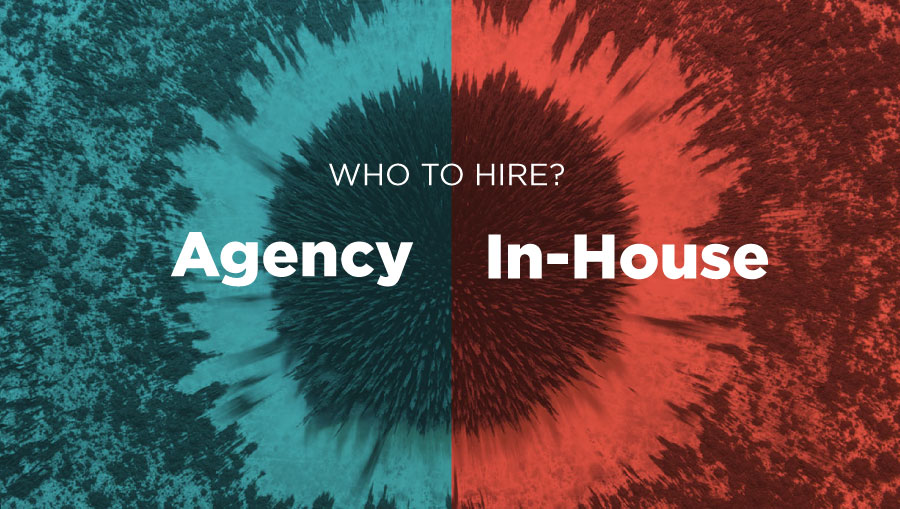
When Should You Hire an Agency?
The ROI of hiring an agency is simple in principle:
- Cost. For the same cost, you can either (1) hire one FTE (full-time employee) or (2) you can access a full team of experts and only pay for the time or work you need through an agency.
- Top Talent. Since agency teams have survived in an agency world where they need to deliver great work for multiple organizations at any given time, you can often get access to better talent than you can find from an FTE – with a much more diverse portfolio of work to pull from.
- Breadth of Expertise. FTEs are typically either specialized in a single area (or a few, select areas), or a generalist without deep expertise in any area. With the ever-changing world of marketing, finding a single FTE who can do it all is nearly impossible.
- Third Party Input. What happens when you can’t agree on a strategy internally, or which organizational goals to prioritize? What if you’re leading your organization down the wrong path? Agencies can help provide a fresh perspective and, if they’re worth their salt, audience-obsession through rigorous research, that can serve as a tool to unlock effective decision-making. If internal teams disagree, having a neutral party contracted to deliver results can be a helpful voice to break through the gridlock.
- Capacity. If you do manage to find a white whale FTE, they’re limited to 40 hours a week to try and run a full marketing department. Agencies can easily solve this capacity problem, running a full marketing department without forcing you to pay for one.
- Easier Transitions. Hiring – and, if you need to, firing – an agency is often easier than hiring and firing a dedicated, full-time member of your team. If you choose the right agency, they should never put you in a position where you’re handcuffed to their services by withholding logins or knowledge of your tech setup.
When Should You Hire In-House?
As your organization grows and develops, it may make sense for you hire in-house. Here are some common situations where hiring a FTE may make more sense than contracting more hours with an agency:
- Regular, Repeatable Work. If you regularly face over 40 hours a week of work in a specific marketing area, hiring in-house vs. an agency may be right move. For example, many organizations will hire an in-house developer to help manage the maintenance and growth of their website and online platforms once their organization reaches a certain maturity. As big projects emerge, like redoing the website, they may even hire an agency and have their in-house developer serve as a point of contact and in-house project leader.
- Capacity & Cost. While agencies can give you access to a wide array of expertise, you may find that you’re using them more heavily for expertise in one area, i.e. graphic design work. If the value of this work can justify the cost of an FTE – and you don’t need the world-class quality of an agency designer to keep the lights on – you can save on costs by hiring an in-house designer instead of paying the higher agency-rate.
- Data & Platform Ownership. Knowledge of your databases and ownership of your platforms may determine whether your business can operate successfully or not. You don’t want to be stuck with a partner just because you wouldn’t be able transition work without them. Having a mix of in-house expertise and contracted agency expertise is usually the recipe for successful growth – it’s rarely entirely one or the other.
- To Manage an Agency. At Magneti, we typically only partner with companies that have at least one in-house marketing point-of-contact. That way we don’t spend all our contracted hours trying to navigate a company’s infrastructure or tracking down the CEO for input, and can instead focus on delivering amazing results. Regardless of the type of work you want from an agency, they’ll want your feedback and approval. They’ll probably need a lot of things like channels access, organizational history, and an understanding of your unique tech mix. Having at least one in-house marketer can be an effective bridge to ensuring your stakeholders don’t spend all their time facilitating marketing activities.
What if I’m still not sure whether to hire an agency or a full-time employee?
Here’s a post from SEO maverick and thought leader Rand Fishkin that explores the pros and cons in-depth.
2. What Type of Agency Is Right for You?
If you’ve decided a marketing agency is the right path to growth, there are a few types to choose from.

Different agencies can serve different kinds of needs, and how they talk about themselves can offer a lot of insight into how they operate. Here’s the lay of the agency landscape.
Ad Agencies
 The term “ad agencies” itself is a hangover from the mad men days where marketing was primarily advertising. The marketing team was tasked with taking the product and making it sound awesome.
The term “ad agencies” itself is a hangover from the mad men days where marketing was primarily advertising. The marketing team was tasked with taking the product and making it sound awesome.
Think: a cool billboard with a slick slogan, cool art/photography, and the goal of presenting the brand in a fresh light.
Agencies that call themselves an ad agency in 2021 likely offer a much more broad range of services than just advertising. However, “ad agency” was the name for a company that does this type of outsourced “growth” work for many decades, and it has stuck.
Ad agencies (along with full-service, described below) are most likely to desire agency of record contracts which are, for sake of discussion, the right to be full-service. The AOR model is dwindling in many ways as a mix of specialized agencies can typically drive the ability to achieve ROI more than any one partner.
At Magneti, we don’t call ourselves an ad agency for lots of reasons. This next few sections will highlight why.
P.S. Have you watched Mad Men? Gosh it’s good. It’s also nothing like our business day-to-day. Fewer cigarettes and suits, more analytics and computers, equally abundant alcohol during daytime meetings.
Full Service
 Many agencies will call themselves “full service.” Heck, Magneti spent several years telling people that we were full service. It’s an excellent way to meet a lot of people, grow your portfolio, find what you like to do, and be a team that helps clients across a broad spectrum of needs. Full service is also fun because you can be deeply integrated in the client’s team.
Many agencies will call themselves “full service.” Heck, Magneti spent several years telling people that we were full service. It’s an excellent way to meet a lot of people, grow your portfolio, find what you like to do, and be a team that helps clients across a broad spectrum of needs. Full service is also fun because you can be deeply integrated in the client’s team.
The full-service strength is also its weakness. It’s impossible to be excellent at every tactical service offering, and therefore full-service marketing is reactive. Clients realize this. When we told people we were full-service, a common response was, “So, what is Magneti’s sweet spot?” This is a veiled way of kindly asking, “No, but what do you actually do well?”
What’s the difference between an ad agency and full service? Sometimes nothing. Some agencies call themselves ad shops because people understand the term but offer everything a client would need: PR, brand, design, digital + web, print, planning/buying, research, strategy, etc.
During our time positioned as full-service, we learned that our strength is in two core areas: brand and digital marketing. No more full-service.
Brand or Creative Shops
 These agencies tend to focus on excellent creative deliverables like visual identity (logos), websites, print collateral, etc. These teams are usually run by “creatives” – designers or writers who are great at producing exciting work. They tend to be focused on the process and pace that allows for a high standard of artistic excellence.
These agencies tend to focus on excellent creative deliverables like visual identity (logos), websites, print collateral, etc. These teams are usually run by “creatives” – designers or writers who are great at producing exciting work. They tend to be focused on the process and pace that allows for a high standard of artistic excellence.
Brand-oriented creative shops not only think about deliverables, but how to build a compelling and interesting brand over time. These agencies seek to create a whole system that communicates vision, quality, and values – not just a single piece of unrelated collateral.
In our experience, teams like this shy away from discussions of business impact and ROI. They don’t tightly align their deliverables to specific, measurable business objectives. Some, in fact, do “art for the sake of art” and miss the thing that drives their customer: measurable, repeatable business outcomes.
When you’re looking for excellently designed brand elements, this is the place to go. They’ll give you the visual and verbal “WOW” factor that separates great brands. Brand shops can also offer things like in-store user experience and environmental branding.
Public/Media Relations Firms
PR firms focus on placing stories in targeted media outlets through earned media.
This business is usually high-risk, high-reward. Some startups, for example, have launched by getting a single story featured in a prominent outlet like TechCrunch.
You can also spend a lot of time and money trying to create buzz via PR that doesn’t build momentum.
PR can be a great addition to a healthy marketing mix, however, beware: PR can exacerbate the leaky bucket problem for many companies. If there’s a hole in your conversion strategy, pouring in a whole lot more traffic isn’t going to give you the ROI that it should.
Learn more about the leaky bucket problem >>
If you’ve done the work downstream, PR can be an excellent way to boost awareness and traffic. Good PR professionals can help you create stories worth sharing and do the hard work of making sure those stories are heard broadly.
Inbound / Digital Agencies
There are many specialties within this category: SEO, PPC, video, etc. Digital agencies are full of metrics-nerds. Math rules! We only know as much as our analytics tell us.
Digital agencies aim to capitalize on technology tools and platforms to show results. This is what drives us toward results at Magneti.
 We believe marketing should be a profit center and show measurable ROI. So all activities should be planned, mapped to goals, expected outcomes – then rigorously measured and refined. This ability is not necessarily exclusive to digital agencies, but tends to be in the DNA of people who work at them. As we say at Magneti: “If we’re not testing, we know nothing.”
We believe marketing should be a profit center and show measurable ROI. So all activities should be planned, mapped to goals, expected outcomes – then rigorously measured and refined. This ability is not necessarily exclusive to digital agencies, but tends to be in the DNA of people who work at them. As we say at Magneti: “If we’re not testing, we know nothing.”
The rise of the digital agency has highlighted one of its weaknesses: such a deep reliance on tools means that these marketers can forget the foundations of marketing methodology. Here’s a fantastic article from Samuel Scott that has brought up excellent discussions for us over the years, and led to a reinforcement on good marketing strategy models.
Magneti aims be the most innovative and effective digital agency in the world, where clients know that we seek, before anything else, to drive measurable business results.
We don’t just produce deliverables, but own the business objective, map thoughtful strategies, and leverage modern technology platforms to drive, test, and measure those outcomes.
What kind of agency is Magneti?
From the previous paragraph, you’d guess that we call ourselves a digital agency. That’s partially true.
We’ve found that digital marketing tactics don’t tend to build momentum over time without a thoughtful, compelling brand underneath it. Converting traffic to leads is great, but how do we position an organization to own the right perceptions?
Magneti is a hybrid Brand + Digital Marketing Agency. We like to say that we can help organizations refine their story (brand!), and use that story to drive measurable results (digital!).
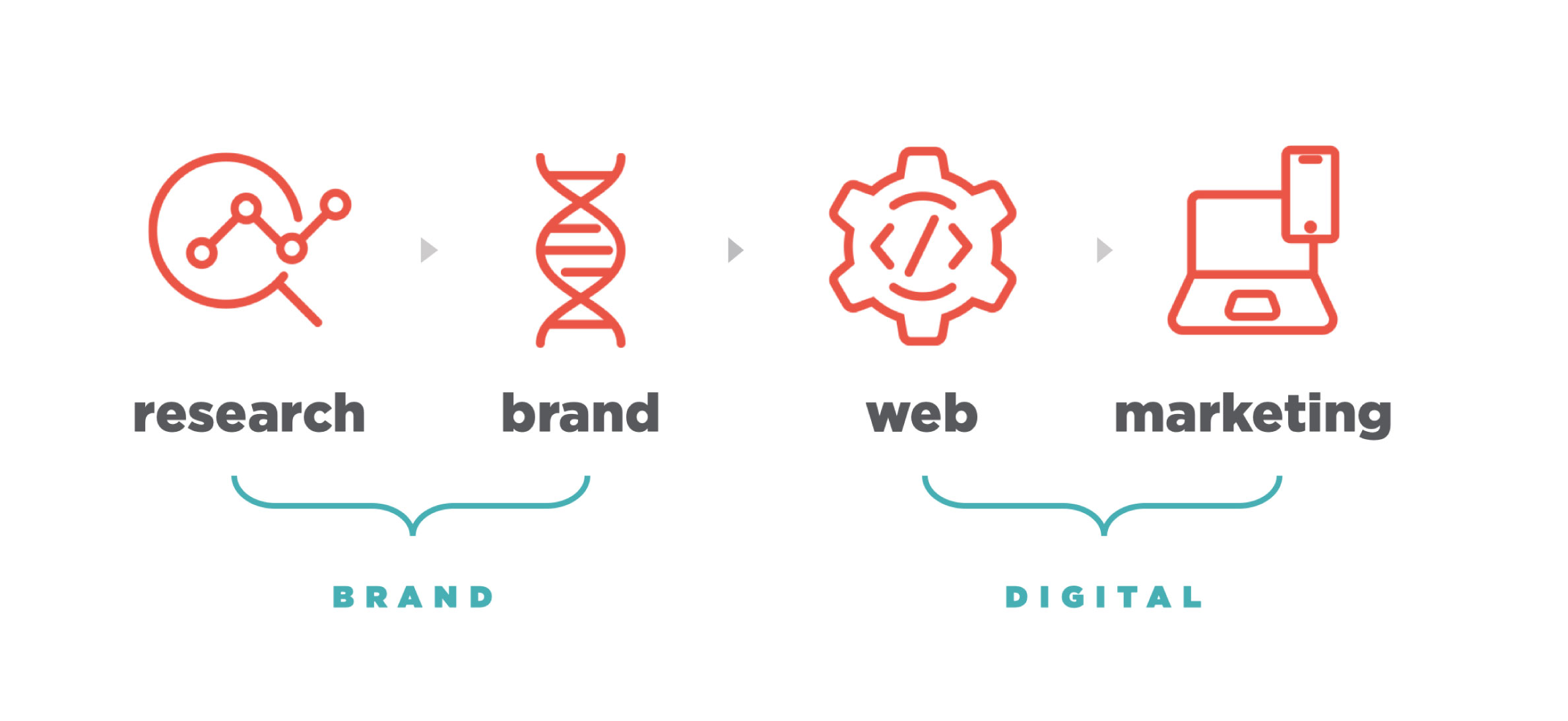
This is also known as full-stack digital marketing. As opposed to full-service marketing, full-stack digital marketing is responsive and is focused on the chain of value delivery. Magneti is a results-driven agency.
Looking for a little more context before you make a decision?
DesignRush provides a helpful guide to locating top agencies in your area with different sets of expertise.
Need help deciding which type of agency is right for you?
We’re happy to point you in the right direction based on your needs. Magneti is not a fit for every need, and we know plenty of agencies that do fantastic work.
3. How to Hire a Marketing Agency
You’ve heard that an agency can offer many benefits: expertise and specialized services, an outside perspective, an increase in your internal team’s capacity, easy management. Agencies are also cost effective — they are essentially independent contractors for your company.

While your internal team may have some hesitations – what does this mean for my career growth? Are you trying to replace me? –finding the perfect partner can put your team at ease and unlock a whole new tier of marketing results.
Here are some tips on sourcing and choosing the right agency partner from Magneti team members:
 Get a sense of the culture.
Get a sense of the culture.
Deliverables and results are important. But the business world moves fast, and one of the best skills to look for is flexibility. When things change for your business, does your marketing agency pivot well? This is driven by their culture and attitude towards change. Take the time to get to know the folks who will be working with you – not just through a contract, but as the real humans you’ll be interacting with. – Jesse Marble, CEO
 An obsession with learning.
An obsession with learning.
We have a mantra at Magneti: A) Always, B) Testing, C) Learning. Whether you’re looking for an agency with skills in CRO, email, or direct mail, look for an agency that will be obsessed with tailoring those skills to your organization and audience. Can they conduct quality consumer research? Can they describe methodologies for in-campaign testing? Those who love to learn will learn what works best for you. – Ben Robb, VP, Brand
 Look for a good cultural fit and a team that gives unique insights.
Look for a good cultural fit and a team that gives unique insights.
There are a lot of good marketing agencies in the world, and many do very similar (and good) work. However, you don’t have to settle for an agency that just does good work. If you see your agency as a partner rather than a sub-contractor, you want them to fit your culture in the same way as hiring an employee. You should also learn about your potential agency’s thought process in challenging situations. Can they answer why something is happening, not just guessing at a solution? These unique insights should help display their level of expertise. – Ray Cameron, VP, Digital Marketing
 Go with your gut.
Go with your gut.
The creative process requires a positive, trusting environment where our most personal ideas can get lovingly ripped to shreds. A functioning environment of celebration and critique is a delicate, nuanced balance. Trust yourself, follow your gut, and choose what feels right to you personally (and not just to your balance sheet). – Mark Rantal, Creative Lead
 Find an agency that asks your industry’s toughest questions.
Find an agency that asks your industry’s toughest questions.
Find an agency that’s obsessed with learning your industry beyond the jargon and deeper than the keywords. Find an agency that asks your industry’s toughest questions and then works to answer them.– Arlis Mongold, Digital Strategist
 Find an agency that believes in what you’re doing, who you are, and where you’re going.
Find an agency that believes in what you’re doing, who you are, and where you’re going.
Does their company culture complement yours, or help you explore an area you haven’t? Are you excited to work with these people? Every agency has its sweet spot. Define your needs clearly and find an agency that fits.– Anthony Hyatt, Marketing Director
 Pick the people that make you feel uncomfortable (comfortably).
Pick the people that make you feel uncomfortable (comfortably).
The agency you choose should make you uncomfortable with how much you don’t know, while making you comfortable knowing you are in good hands. They should have people who understand you. People who ask lots of questions. People who work as hard as you to achieve success. – Karen Waldon, Senior Marketing Specialist
 Hire an agency just like you would hire for your own internal team.
Hire an agency just like you would hire for your own internal team.
As an agency, we think of ourselves like a part of your team. When hiring an agency look at experience, references, skills, and culture fit! Just like you would a potential employee. This will make working together easier and more effective. – Spencer Brown, PPC Manager
Finding the right agency to complement your team can be hard, but it is worth your while. Just look at our testimonials for proof.
4. How to Work With A Marketing Agency
Let’s say you’ve hired the right marketing agency. You put a lot of resources into finding the one, but you’re not quite done yet — it’s time to set yourself up for a long-lasting agency relationship.

Even the best relationships take work, and agency relationships are no different. The good news is that, like most things, great work yields great results.
Establishing a healthy agency relationship often comes down to two simple things:
- Healthy communication
- Clear expectations
Agencies that make these two items a priority from day one are much easier to work with than those who embody characteristics of what we like to call The Magician in our archetype work: they take your watch (budget), go behind a curtain (don’t call or email), and emerge three months later with something you didn’t approve or really shape at all.
That’s not a knock on magicians or magician archetypes – some are really good at communicating and that makes the trick (the work) even better. We’re just skeptical of the ones who don’t call you back.

Building the Bridge of Agency Account Teams
In an agency structure, the account team serves as a bridge between two islands. For the sake of this metaphor, let’s call one island Client Island. The other island is the Agency Island, or what we’re calling Marketing Team Island due to this graphic we made in 2016.
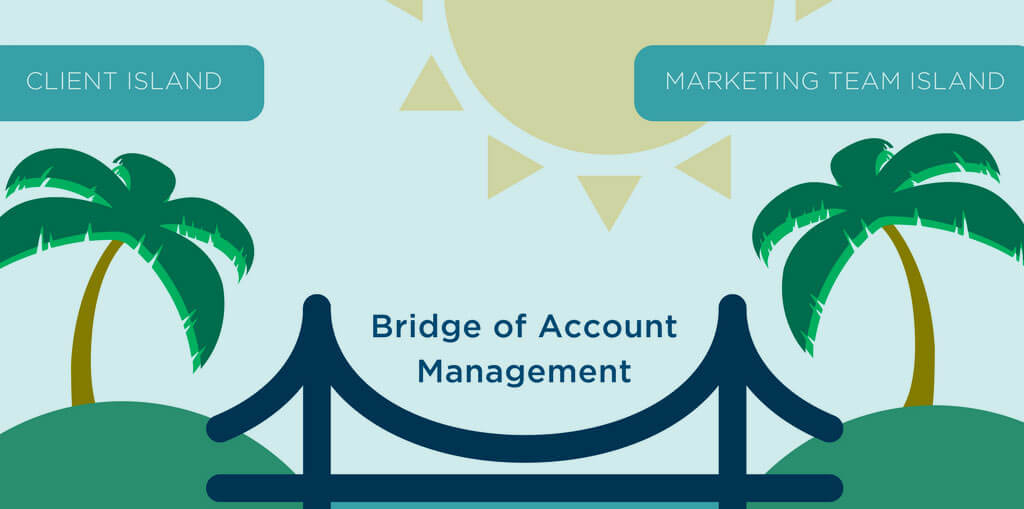
Each island has a diverse cast of characters. The bridge is well-travelled and sees thousands of crossings per day. It has cracks and is sometimes creaky.
The job of the account team is to keep the bridge strong and keep the inhabitants of each island happy and busy. Idle or unhappy islanders can take the bridge down.
Let’s Start on Client Island
When you contract with an agency, you’ll inherit the title of Client.
Client carries with it lots of baggage (just like the words agency, contractor, or IRS). Clients can be perceived as unreasonable, naive, unempathetic, high maintenance, or overly demanding. They can also be perceived as beloved, favorites, amazing partners, and sometimes even close personal friends.
In most situations, you’ll also join a group of other clients – other islands in this metaphor – who are competing for the agency’s time and attention.
Contracts can act as helpful buffers between islands, but they’re really just a starting point. Once the work begins, priorities can change and rhythms get established.
You can quickly drop off any negative Client baggage and embark on a successful journey with one quick conversation. One word, even: Expectations.
Establishing Clear Expectations with Your Agency
Whether you’ve contracted with an agency for an individual project or for a set period of time with certain objectives in mind, you’ll have a lot of conversations with a sales team.
Sales teams are great at getting you oriented into an agency, negotiating contracts so that they’re win-win, and building trust from day one.
The downside of sales teams is that once you sign the contract, you’ll typically be handed off to a whole new group of people: the account team. The good news is, these people know way more than the Sales team since they actually do the work. The downside is that you’ve probably never met them.

Now, most agencies will take good notes during the sales process and complete an internal kickoff to help bridge the gap. However, just because these groups met behind closed doors, it doesn’t necessarily mean the trust you have with the sales team will automatically transfer to the account team.
There’s some fresh trust-building that needs to happen, and setting the right expectations is the key to cracking this complex knot.
Effective agencies help bridge the gap for you.
Effective agency account teams are aware of this tension and will drive these trust-based conversations so you don’t have to. Delivering on early, low-bar promises like we’ll send you an email with a recap and some questions (and then actually sending that email) is a good signal that they’re dedicated to making sure you have a good experience.
are aware of this tension and will drive these trust-based conversations so you don’t have to. Delivering on early, low-bar promises like we’ll send you an email with a recap and some questions (and then actually sending that email) is a good signal that they’re dedicated to making sure you have a good experience.
They’ll move quickly, communicate often, work hard on building rapport with you and your team, and get obsessed with getting you the results you want.
Meet the team before you sign.
To help get a head start on building trust with the account team, you can ask the agency to include the account team in the sales process with questions like:
- Who on your side will deliver this work?
- Can I meet them before we sign?
- What kinds of inputs do they need from us to do their best work?
How does Magneti handle this tension?
We include our account leads in every sales process, so that our clients never experience a complete handoff. Other teammates will join the party left and right, but our main points of contact are involved from the first few sales meetings all the way to the day the contract is over.
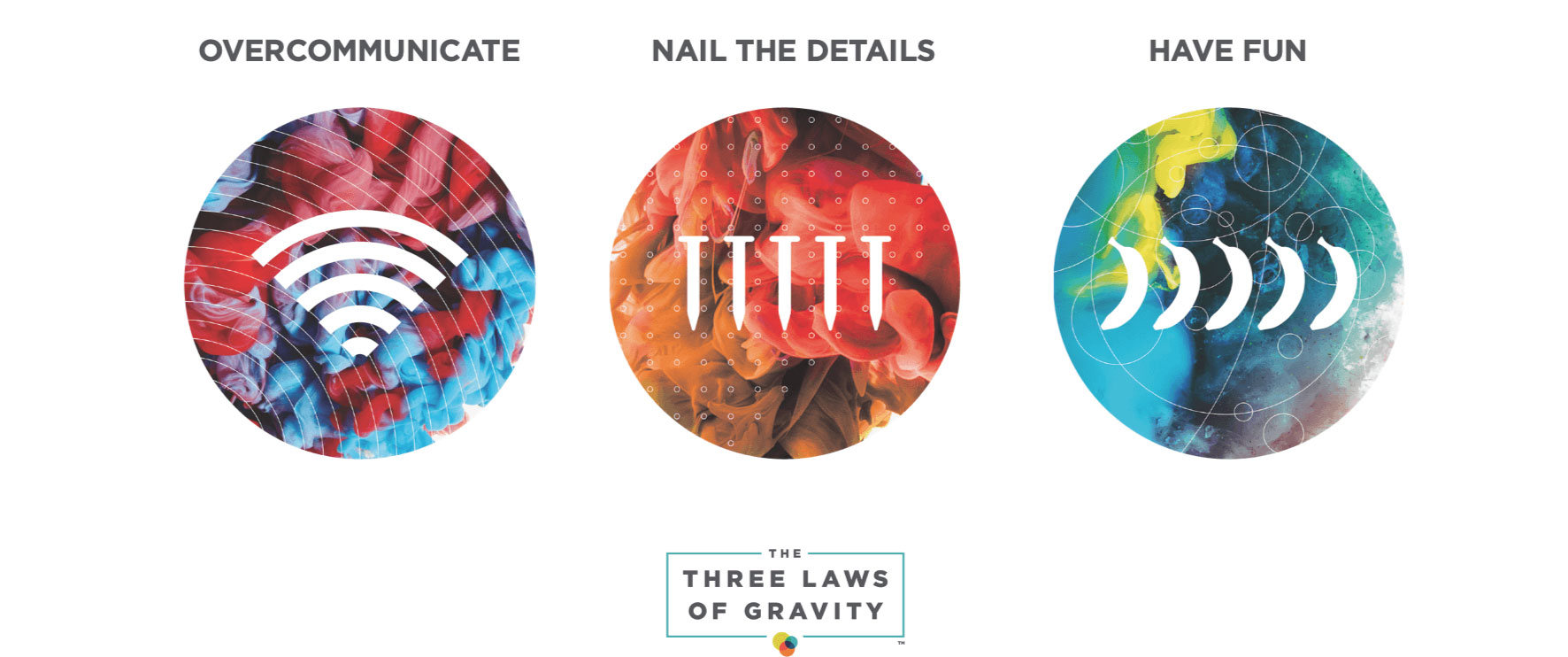
Once you’ve started working together, get to know the account team.
Establishing trust in an agency relationship starts with having a good relationship. When you like the people you work with, you’re much more willing to take risks, meet each other halfway, build on each other’s expertise and ideas, and do amazing work together. That’s true within agency teams, and it’s also true for any client / agency relationship.

What are the keys to unlocking a great agency relationship?
They’re the same keys to unlocking a great relationship with anyone. Try to find common ground, enjoy your time together, and don’t let a contract get in the way of understanding and getting to know the people you’re working with.
And, like a great relationship, setting expectations can help everyone relax and focus on the quality of the work instead of when it’s coming and whether this was a good investment.
 Establish the Right Rhythms.
Establish the Right Rhythms.
Establishing expectations around rhythms that can often unlock success with your agency. Having a conversation on your preferences that results in clear answers around things like:
- How often will I hear from you?
- How often will we meet?
- I prefer calls instead of emails. If you email me too much I will get annoyed. Is that okay?
- What if I hate the first draft of a deliverable?
- I have strong opinions on language, but don’t really know much about design. Does that shape how we do our work together?
- This deadline absolutely cannot budget. But this guy over here, he’s a little more flexible.
- I want to understand why we’re picking the strategies we are, rather than you just going out and executing. Can we have a conversation before we decide on a direction?
- (OR) I want more leads. I’ve already got a full time job and half and I trust you to do excellent work. Don’t let me be a bottleneck. I’d rather you ask forgiveness than permission.
If you feel like you’re in the dark at any point, say something to the account team. The earlier you say it, the better. Don’t let frustration boil over if it doesn’t have to. If you’re not pleased with the results, voice it early.
At Magneti, we often start meetings, workshops, and presentations by saying the only bad outcome is not getting clear feedback – positive or negative.
You should never feel like you can’t be transparent with your account team. If you get the sense early on in the sales process that you can’t be honest with these folks, you might not be chasing the right partner.

Establish a Single Point of Contact.
Remember the island and bridge metaphor between you and your agency? One of the best ways to keep communication healthy and clear is to try to limit the number of people on the bridge at one time to one person from each island.
Any more than that, and the bridge might break. Here’s what that means:
- Imagine you get a web page design from your agency, and you send it back with some feedback.
- As they’re starting to implement it, someone else from your organization sends some more feedback and cc’s you.
- Then, a board member chimes in with more feedback that contradicts the feedback you already sent.
Now, agencies are used to this shuffle. However, getting conflicting notes and ideas will probably slow down the process of them getting you something that’s ready for primetime.
On other hand, imagine getting 17 emails from different people at the agency asking you questions. That’s not helpful for you on your never-ending quest for inbox zero.

Establishing a single point of contact both at the agency and at your organization – someone who can consolidate questions and feedback, facilitate conversations, understand the landscape and everything that’s happening at once, etc. – can help keep projects on track and speed up your path to results.
How Agencies Are Set Up
What happens on Client Island should probably not stay on Client Island. In fact, the interactions from Client Island (marketing goals, objectives, and projects) must make it back to Marketing Team Island.
Here’s how the structure of an agency typically works:
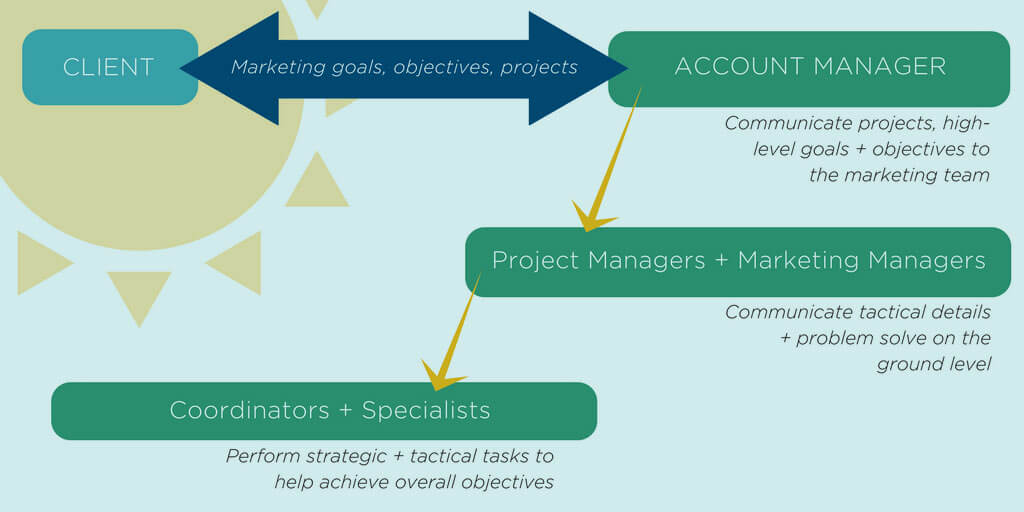
What agencies call an ‘Account Manager”
An account manager’s job is to lead and direct his or her marketing team. While they’re typically high-level strategists in charge of growing and maintaining relationships, account managers usually have enough of an understanding of the tactics needed to guide projects well. These roles usually don’t include any implementation – and, instead, are heavy on delegation.
For example, an overall goal of yours might be to drive more online leads. The account manager could recommend a strategy that includes channels like pay-per-click, then hand things over to the rest of the account team to implement.

Marketing Managers, Project Managers, and Coordinators
Account managers usually manage a large variety of accounts and are quick to lay out priorities, then hand them over to implement while they’re onto the next conversation.
Project Managers and Coordinators or, at Magneti, Marketing Managers, will then weigh in on those strategies and turn them into tasks and timelines. These folks thrive at tapping on shoulders, clearing roadblocks, inputting insights, and delivering excellent work with excellent expectations.
If an account manager decides on a PPC strategy, a Marketing Manager will then communicate with you on budget and timing, create messaging, work with a designer to put together ads, loop in a developer to build a landing page, hand things over to a PPC specialist to build the audiences, and, with a final vote of approval from you, flip things on. A month later, they’ll walk you through the results.
Specialists
In an agency, coordinators and specialists execute tactical tasks to support the overall goals of the projects. These can be developers, designers, copywriters, SEO specialists, PPC specialists, CRO specialists, platform-specific experts, Data Analysts, UX designers, etc. There’s a whole host of specialities that can fit into this category.
Depending on the agency size and structure, these people might work full-time and in-house, or they might be contracted on a project or hourly basis (take the agency vs. in-house argument above, and apply the same hiring priorities and concerns).
Once a Marketing Manager hands off the PPC budget and timeline, the PPC specialist will then set up the campaign and help optimize it to drive results.
The Realities of Working with an Agency
In a perfect world, you’d sign a contract, sit back, open your favorite crisp beverage, and one-timeline-later you’d see the right results. Then you’d click renew, and do it all again.
Sometimes, contracts go exactly as planned, everyone is thrilled, revenue comes in the door, and engagement sizes grow with more upsides for all.
However, priorities can change. Companies can pivot, customers can change preferences, and scoped work can run into unexpected roadblocks.
If you find the right partner, understand how they’re set up, and establish clear expectations with regular, healthy communication, they’ll be willing to pivot with you. The best agencies are in it for the long haul.
Tips on a Successful Agency Relationship from the Team
Our CEO Jesse Marble was recently featured on a B2B Growth podcast called How to Hire an Agency and Be a Good Partner. He spoke about the best ways to approach an agency partnership and how to set yourself up for success. Other current and former teammates also brainstormed top tips for a strong, long-term relationships with your agencies:
 Trust is the core component.
Trust is the core component.
Partnership fails without trust. The way to gain trust is through open, honest and constant communication. If the client or agency feels something isn’t right, not mentioning it puts a strain on the relationship. No one can fix problems they don’t know exist. Clients should work with agencies that they know they can be honest with. – Adam Williams, Executive Chairman
 Remember your goals!
Remember your goals!
There are a lot of activities that can keep you and your agency busy — lots of trends and ideas that can steal your attention. Review your organization’s goals and your marketing goals monthly to make sure all of your efforts are aligned. The work that you and your agency do is most effective when it’s done to achieve specific outcomes. – Ray Cameron, VP, Digital Marketing
 Affecting change takes time.
Affecting change takes time.
If there is a strategic element to your engagement, be prepared to wait before you see results. Planning for and implementing big changes to an established marketing program can take months. Your agency will need to research, analyze, plan, test hypotheses and test them again before rolling out important changes. If the process goes well, it will be worth it. – Ben Robb, VP, Brand
 Ask how to give design feedback.
Ask how to give design feedback.
Talking about visual design is hard. Many bring their own subjective values and feedback to an aesthetic conversation, expecting others to translate fuzzy words like “pop,” or “eye-catching,” (the best I’ve heard is: “We want more zhush!”). But bringing examples instead of opinions can make a world of difference. Good design is “show, don’t tell.” Take the same approach when working with designers. – Mark Rantal, Creative Lead

Request Weekly Updates.
Often, there are a lot of moving pieces your marketing team is managing, and it can sometimes be difficult to keep abreast of what’s happening. Requesting a weekly email that summarizes the week’s activities can help mitigate that. – Arlis Mongold, Marketing Manager
 Cast vision together.
Cast vision together.
Agencies operate best when you give them your organizational goals and work backwards, versus handing them one-off projects. Trying to attract new customers? Grow your social following? Get more ad revenue from time on site? You’ve already hired a team of marketing experts trained to diagnose and treat. – Anthony Hyatt, Marketing Director
 Focus on strong communication.
Focus on strong communication.
Be open and honest with your agency about updates, feedback and changes regarding your business, products or the work your agency delivers. They are working hard to make you look good! They need honesty and the most up-to-date information from your team to be successful. – Mike Clothier, Former Senior Marketing Manager
 Remember your agency is your partner.
Remember your agency is your partner.
You and your agency are both working towards the same goals, and you both bring something unique to the table. You are your business expert – you know your products and services better than anyone. Your agency brings extensive experience in a variety of marketing areas. Combine these perspectives and work together to brainstorm, strategize, plan, execute and see results. – Lily Benjamin, Marketing Manager
Trying to find the right agency partner? Talk to our team of business owners, agency life-rs, former clients, and probably future clients >>
5. How to Measure Success with Your Marketing Agency
As an agency, we’re always looking for ways to measure success. Sure, measuring effort is common, but since we strive to be the most innovative and effective marketing team in the world, that means moving the needle.
Defining clear KPIs (Key Performance Indicators) is an obvious solution and an important part of any successful campaign. But, to take it a step further, we’ve developed a simple visual that we call “The Results Ascent” to help you visualize progress with your agency.
A quick reminder before we dive in – results take time depending on the strategy. For example, within digital marketing, you can buy traffic today with PPC, but SEO and content marketing strategies take longer to pay off.
Similarly, you could be on TV within a week if you have the budget, but guerrilla marketing and brand awareness campaigns take time to build momentum. Before you become unhappy with results, take a step back and make sure your expectations are realistic.
The Results Ascent – A Journey to Marketing Success
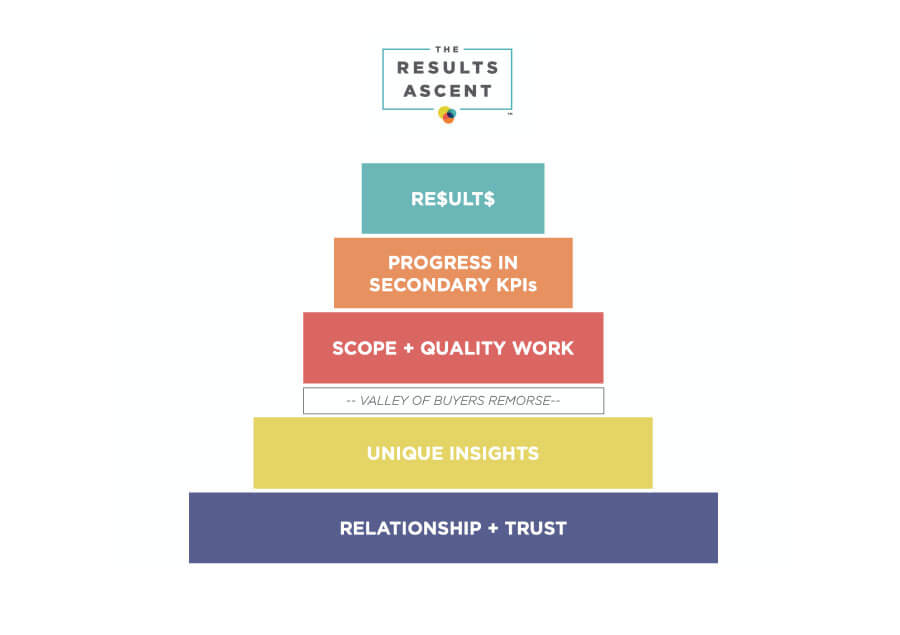
Relationship + Trust
You hire an agency based on potential results and trust. You don’t buy “stuff” from an agency – you buy results, skills and expertise. After you pay the first invoice, you don’t have a tangible item to show off. So early on, if you don’t have a healthy relationship based on trust that the agency will generate results, you shouldn’t have hired them!
Unique Insights
From day one, the agency will start communicating unique, clever and valuable insights that they’re finding as they dig into your campaign. You’ll hope to say things like: “Whoa, we didn’t realize that about our own business.” Again, the agency probably will not show measurable results yet, but you’re seeing their genius applied to your problems and learning how they are identifying and navigating around roadblocks.
The Chasm of Buyers Remorse
Usually, the first 30-60 days into a new agency relationship is the most tense. The client is paying bills, but the agency is still cranking to deliver first batches of work. The client starts wondering if they hired the right team, and the agency knows it. The agency is frantic to show progress of some kind, but knows that good work takes time. You’ll likely not enjoy this valley, and, trust me, neither does the agency. Instead of panicking, remember to trust your agency but don’t hesitate to ask or communicate concerns either!
Scope + Quality Work
Along with those insights, the agency is starting to deliver, well, deliverables. You’ve now seen how your agency works and how they collaborate with you. You should see that they’re working hard on the scope you’ve defined together. At this point in the relationship, you’re getting a sense for their quality or work, communication skills and attention to detail. Still no results, but you now trust the decision to hire this agency. Or, on the flipside, you know now that they can’t do good work and you’ve got a deep ache in your stomach knowing you need to fire your agency.
Secondary KPIs
Secondary KPIs are things like organic traffic, web leads, time on site, email list growth and decrease in cost per lead. The summit is in sight! It’s still not the results you were expecting, but your agency is working to move the needle and it’s all part of their process and strategy to finally get you to the results you want to see.
Re$ult$
The final stage of the ascent: what you hired the agency for (we hope). Many agencies get hired for deliverables. Hopefully, instead you’re looking for measurable, attributable financial outcomes in sales and marketing.
A direct comment about Magneti now. We can help you grow, and we work hard at that. We define what’s measurable early on with each client, but if we’re not doing work that’s making a tangible difference, we’d expect you to fire us. Yep, I said it.
What happens if you don’t get to the <insert Results Ascent stage here> with your agency?
Relationship + Trust – If you never trusted your agency, then why did you hire them in the first place?
Unique Insights – If you feel like your marketing team never provides insights unique to your business or problem, there’s no excuse. You should always feel like your agency is bringing clever learnings to the table! Heck, we’ve written a whole list of reasons why you should probably fire your agency.
Scope + Quality of Work – If you don’t sense that the agency is getting you to this point, again, fire them early. You should be able to tell right away (within a couple months) that they’re executing to the scope you hired them for, and that the work they’re producing is a good reflection of your brand and expectations. TIP: if you have expectations for the agency, make sure you communicate them! Also, when the agency delivers work, give feedback. They should be listening, so make your thoughts known. Agency people might be smart and clever, but I have yet to read a resume that includes mind-reading.
Secondary KPIs – Yes, you should see progress here, but depending on the strategy, you might need more time. For example, SEO results can start to pop up in as little as two weeks. Sometimes, it takes between four and six months to see stable SEO growth.If you never get to this point, do you have the right KPIs? Was the scope and plan designed to drive these KPIs? If you’re doing a heavy email marketing approach but your social media isn’t growing, maybe you need to chat with your agency about scope and plan. Especially if you trust their quality of work —question the strategy or plan.
Re$ults – If secondary KPIs are moving but results are still thin, I hope you have a healthy partnership to chat with your agency. Are the secondary KPIs well-aligned with the results you’re trying to measure? Your agency should be able to collaborate with you each step of the way. And if they can’t, it’s surprising you made it this high up the ascent!
I’ll be honest for a minute: we don’t always get to the results level with clients. And in some cases, we encourage them to fire us. We successfully ascend past insights and quality, start seeing KPIs move, but our efforts just aren’t driving sales. Usually when this happens, we’ve built enough trust that the client knows that we’re a trustworthy team, but that we need to reassess our plan and scope together.
The Key to Getting Results with Your Agency
Going through this ascent journey with your agency is key to getting the results you seek. By using a process founded in true understanding, growth and partnership, you can ensure you’re headed towards getting the right outcomes at the right time. The quicker you move up the ascent together, the better! But good things take time. Have questions? We’d love to discuss this idea with you.

6. How to Fire An Agency
Maybe you’ve had it. The results aren’t there, the trust is missing, and you’re past the point of no return. Maybe expectations were misaligned, or maybe your needs have changed and you can no longer justify the cost.
Whatever the reason, there are some steps you can try first:
- Communicate with the right people. It can be tempting to call the CEO right away and skip dealing with the team. However, most agencies are structured in a way that CEO’s don’t get very involved in the day-to-day work. Calling the big boss can help get a response quick, but at least start by voicing your concerns with the account team. They understand your business better, they know the work, and they probably have a lot of ideas on what could be going better. Give them a chance to respond first before you go over their heads.
- Have an honest conversation. A very honest conversation. Lay out your concerns, where expectations were missed, and what’s not working. Your agency might surprise you. Or, if they know they can’t serve you any more, they may take the first step in parting ways. Mature agencies and business partners know when things need to change, and they’ve probably felt the tension too.
- Be open to pivoting. Maybe the partnership isn’t the problem – it’s the engagement. Agencies by nature are flexible, so let them problem solve for you. Communicate your concerns and see if they’re in a position to address them with a new scope of work or even bringing in a different members of the team.
Before you break the news…
If you’ve exhausted all other roads , there are a few things to make sure you have in place before you break the news – even if you’re chasing a ticking clock towards an oncoming deadline:
- Make sure you have access to all your own channels. This probably sounds obvious – and if your agency was a good choice in the first place, they’ll make sure you’re set up for success even after you’ve fired them – but double checking that you can access and transfer management of all your platforms is crucial to being able to move on to a new partner.
- Ask for any relevant reports that might help your next partner. You may already be archiving these somewhere, but if you want your next partner to have a leg up on PPC performance or SEO activities, showing them the priorities and progress of your last agency will likely help speed up your onboarding.
- Double check your contract. Many agencies include cancellation clauses that should factor into your decision-making. Take a quick look to make sure you’re not blind-sided by any additional charges or fees that come with any early cancellation.
Firing an agency
The reality is that agencies are used to being fired. It’s part of the deal when you’re operating as a contracted partner to lots of different organizations. They’ve probably felt as on-edge as you in the past few months, and it’s rare that an agency is completely caught off-guard with this kind of news.
Give your account manager a call and be honest. Even though things didn’t work out, keep in mind that they wanted a successful partnership too. These conversations can be tough, but, if they’re coming after a period of no results or hard conversations, there’s often a lot of relief involved.
Be up front on timelines and what you need, and most agencies will try and help make the transition as smooth as possible.
Our #1 Tip
Find a team you love and believe in. Hire them. You won’t be disappointed.
*This post was originally published on April 30, 2019 (plus an amalgamation of a few others) and has been updated to reflect the changing digital landscape of agency partnerships.

